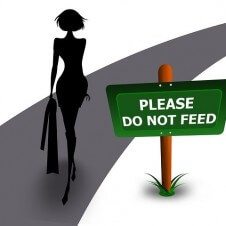Today’s post we dive into Health at Every Size (HAES) as explained by an Ex-Dieter Dietitian with a history of orthorexia and a new outlook on the relationship between weight and health
If you have been following my Youtube channel, you may have seen my latest video series on intuitive eating. I’ve also recently shared my a prelude post to this where I chat about some commonly asked questions related to intuitive eating and mindful eating.
My introduction to Health at Every Size started in undergrad from the amazing Jacqui Gingras. Jacqui taught me so much about HAES, intuitive eating, mindfulness and body positivity. While I was still in the throws of my eating disorder at the time, and wasn’t really in a place to fully embrace it, I was definitely fascinated by the topic and aspired to one day be able to fully embrace it myself.
I’m still on that journey.
But I have come a long way in my understanding of HAES and intuitive eating. I wanted to share some introductory teachings with you in case you have some questions and criticism of the field.
What is HAES (Health at Every Size)?
Health at every size (HAES) is a series of principles designed to acknowledge that weight does not determine ones health. It’s a framework that supports people of all sizes in finding a compassionate way to care for themselves and achieve optimal health. HAES includes three basic components.
Respect:
- Celebrates body diversity;
- Honors differences in size, age, race, ethnicity, gender, dis/ability, sexual orientation, religion, class, and other human attributes.
Critical Awareness:
- Challenges scientific and cultural assumptions;
- Values body knowledge and lived experiences.
Compassionate Self Care:
- Finding the joy in moving one’s body and being physically active;
- Eating in a flexible and attuned manner that values pleasure and honors internal cues of hunger, satiety, and appetite, while respecting the social conditions that frame eating options.
Principals of the HAES movement
The Health At Every Size philosophy simply acknowledges that well being and healthy habits are more important than the number on the scale. Linda Bacon’s book is an amazing place to start and discusses the five major principals of HAES. These were pulled from Size Diversity and Health’s website.
1. Weight Inclusivity: Accept and respect the inherent diversity of body shapes and sizes and reject the idealizing or pathologizing of specific weights.
2. Health Enhancement: Support health policies that improve and equalize access to information and services, and personal practices that improve human well-being, including attention to individual physical, economic, social, spiritual, emotional, and other needs.
3. Respectful Care: Acknowledge our biases, and work to end weight discrimination, weight stigma, and weight bias. Provide information and services from an understanding that socio-economic status, race, gender, sexual orientation, age, and other identities impact weight stigma, and support environments that address these inequities.
4. Eating for Well-being: Promote flexible, individualized eating based on hunger, satiety, nutritional needs, and pleasure, rather than any externally regulated eating plan focused on weight control.
5. Life-Enhancing Movement: Support physical activities that allow people of all sizes, abilities, and interests to engage in enjoyable movement, to the degree that they choose.
Health at every size vs Healthy at every size
It’s important to reiterate that HAES stands for Health At Every Size, not HEALTHY at any size. It’s subtle, but different. As we discussed, the first principal of HAES is that no weight should be pathologized. While I know a lot of you are saying, well what about someone who is 70 lbs and anorexic, or someone who is 500 lbs and bedridden, and to respond, I would quote size diversity and health’s website which states:
HAES shifts the focus to acknowledging and respecting an individual’s circumstances, and works to investigate and support options that are available to help make choices that benefit health and well-being. [In both of these circumstances] using a HAES approach puts the focus on their behaviors, unique sets of abilities, and available resources, and places them in the context of their life as the primary areas of concern and consideration.
The HAES framework is based on the research that shows that intentional weight loss diet don’t work. Through the common restrict binge cycle we see with the diet mentality, can often result in more weight gain. HAES also points to evidence suggesting that yo-yo dieting, and weight stigma, two common outcomes of being in a larger body, may be able to explain the a lot of the health disparities we see in people in larger bodies.
Finally, HAES is also grounded in evidence that a person’s body size and weight is NOT a very good reflection of their health, compared to health-promoting behaviours. So for example, a 2012 study found there were four behaviours that were associated with a lower risk of mortality (regular exercise, a diet rich in vegetables and fruit, moderate alcohol intake and avoiding our quitting smoking). None of which included specifically changing your body size. These are behaviours we can actually control. Furthermore, a series of randomized controlled trials found that a HAES approach was associated with improvements in blood pressure and blood lipids and that these health outcomes were more successful than weight loss treatment.
So HAES is not about telling people hey, just go gain weight, any weight is healthy. It’s about finding the healthiest weight for you and your body! It’s about moving the focus away from the pursuit of just being one specific socially celebrated size. Instead focusing on eating a healthful diet, engaging in physical activity, sleep, stress management, pleasure in life and intuitive eating, all while working with your body wherever it lands in terms of size and shape.
But Isn’t Being Overweight Unhealthy? Don’t “obese” people need to lose weight?
First of all, I know we see a lot of research linking higher weights to disease, but theres a big difference between correlation, which is what that is, and causation, which we cannot prove. There is a growing number of studies suggesting that healthy behaviours, not body weight alone, may be a major contributor. So for example, a meta-analysis found that incorporating more fruits, veggies and fibre reduced the risk of diabetes, improved blood pressure, blood sugar and cholesterol levels even when no weight loss occurred.
There are also a lot of other challenges that people in larger bodies face that may also be able to explain these disparities.
For one, there is the problem of weight cycling or yo yo dieting which is common in larger body people who are constantly on and off weight loss diets. Research has found that when people repeatedly lose weight and regain weight, which we know is pretty much inevitable based on set point theory and weight loss prevention mechanisms in the body, it increases their risk of disease. So for example, one study found that larger bodied women who had dieted had high blood pressure, while larger bodied women who had never dieted had normal blood pressure. In other words, it seems it may be the dieting and associated weight cycling that puts an individual at a higher risk of health issues, like hypertension, rather than the static body size alone.
Second, there is the issue of weight stigma. People think that telling fat people to lose weight will motivate them- news flash, it often has the opposite effect! Research suggests that those who experience weight discrimination have twice the physiological stress as people who don’t. This is associated with type 2 diabetes, hypertension and heart disease. Studies on weight stigma have found that people who are fat shamed are less likely to make changes to improve their health. This is because they’re less likely to go to the doctor or participate in physical activity, and are at more likely to overeat. This is particularly troubling in the medical community. Research has found that weight bias in doctors can cause binge eating disorder, lower motivation for exercise, increased blood pressure and blood sugar, less trust of health care providers and a reduced engagement with health care services leading to advanced and poorly controlled chronic disease and low quality of life.
On the flip side of that, research has found that when people are supported and feel secure and comfortable in their skin, they are more likely to make healthy lifestyle behaviour changes and put their health first, regardless of the number on the scale.
Third, there’s also the social determinants of health which significantly influence the health of populations. These are a range of personal, social, economic and environmental factors that determine the health of individual. Some of the main ones include income and social status, employment and education- all of which research suggests play a massive role in health disparities.
So while we can’t always control those social factors, and we definitely cant always control our genetics, let’s focus on what we can control – our behaviours – and less on shaming ourselves and others over the natural shape and size of our body.
Why do HAES EXPERTS say “obesity” is a bad word?
The word obesity is everywhere in medical literature and yes, it is an official medicalized term. However, there is a lot of reasons why some people find it derogatory and stigmatizing. First, the origin of the word itself feels insensitive as it is literally translated to mean to eat oneself fat. Second, pathologizing a person based on their body shape perpetuates weight stigma and simplifies someone’s identity based on their body weight. This is why the medical community now uses “person first” language when discussing an individual and their illness. So for the same reasons, when I was in school to become a dietitian we were taught to no longer call people “diabetic” and instead saying “person with diabetes” so as not to label someone as their disease.
For those of you with a though love approach, you should also know that shaming someone for their weight is actual counterproductive. Evidence actually suggests that people will engage in healthy behaviour changes when they’re encouraged to achieve a “healthier weight” rather than being labelled as “obese”. I am not in larger body so my role as an ally is really just to listen. If more neutral terms like fat or larger body feels less stigmatizing, it certainly shouldn’t be an inconvenience to respect that.
What is thin privilege? Isn’t a thin body earned?
Thin privilege isn’t about how much exercise one person does to maintain his or her physique. It also isn’t the idea that thin people will never get body shamed for being too small and therefore will never face body image issues or body shaming. We’re all susceptible to that.
It’s simply an acknowledgement that having a socially accepted body size and shape affords you benefits, access and less discrimination in society that larger bodied folk don’t have. Like the idea that any clothing store will carry my size. And an airline seat will fit my body. Or even equal access to employment or health care. That is a privilege!
I mean, there are all sorts of privilege that I think we should reflect on in our life. Thin privilege, white privilege, heterosexual privilege, gender privilege etc. I truly believe we all need to look inwards and see our privilege.
Are you a Health at every size dietitian?
I know this is controversial so I will simply say this. I am HAES supporter and a HAES learner. I’m not a HAES expert. I too am sorting through the research and evidence and trying to make honest sense of it all.
I DO believe the research linking body weight alone to disease is flawed, correlation-based and therefore difficult to tease apart from behaviours. And I also think the research supporting HAES is promising and convincing to me that behaviours play a bigger role, but not extensive enough yet to explain everything. I am evidence based, and I believe that there is legitimate evidence linking body weight to higher risks for some diseases or conditions.
Having said that, is dieting the answer? Of course, there’s a real risk benefit analysis that has to happen here, and more often than not, the risks associated with dieting outweighs the benefits of some modest weight loss. So no, in most cases, I don’t believe that it is. I believe that the world would be better without dieting. We would likely not see our weights increasing beyond their natural set points (aka. we wouldn’t be gaining a lot of weight). Also we wouldn’t be obsessing over sugar, or feeling addicted to food, or shaming ourselves into poorer health behaviours. We would probably be generally healthier as a society- physical and psychologically.
Having said that, I also respect that everyone’s journey is different and I’m not discounting that weight loss may or may not be part of that journey. This is so nuanced and while I may consider myself “anti diet”, I’m not “anti dieter” (as my colleague Christy Harrison once said).
I don’t want you to feel shamed for wanting to lose weight. It is normal to want to lose weight- no matter what your size or shape. Diet culture does makes it overwhelmingly enticing.
But I want to offer people who are struggling with their sense of self worth as a result of that diet culture know that physical and emotional deprivation is not the road to health. And that we all deserve love, respect and nourishment regardless of size.
If you’re curious about health at every size, or intuitive eating, I strongly suggest watching my YouTube channel for my new series. I will be walking through the principals of intuitive eating and also talking a lot about the body positive movement and size acceptance.
In the meantime, leave me a comment if you have any burning questions about health at every size or HAES?
Updated on May 12th, 2022

Abbey Sharp is a Registered Dietitian (RD), regulated by the Ontario College of Dietitians. She is a mom, YouTuber, Blogger, award winning cookbook author, media coach specializing in food and nutrition influencers, and a frequent contributor to national publications like Healthline and on national broadcast TV shows.









Lindsey Q. says
I want to start out by saying, Abbey, I LOVE your videos. You are so kind, thoughtful, and compassionate. You are also WAY more knowledgeable than me so thank you for your educational videos that I just discovered a few days ago!
___
I support and love everyone who is bigger. I, myself, am overweight by about 50(?)pounds, but I am working on it because I do not feel as if I should be this weight if I ate better. Back in October, I started actively trying to lose weight sustainably through finding ways to eat my favorite foods and make them healthier, not stuff myself, pay more attention to nutrition, and counting calories.
The reason I started to lose weight was because I did not feel good. My back was starting to hurt due to inactivity, I felt lethargic (which hadn’t been my norm), and I overall had lower energy and felt uncomfortable in my body. HOWEVEr, I am also working on my mental and psiritual health in order to stop the negative thoughts that I will have about myself. I am definitely trying to approach health in a way that is wholistic.
As far as HAES is concerned, I do not actually think they believe in moderation from what I have seen. People who are popular in the HAES movement (influencers) are often shamed if they decide to lose weight. Those that become active or do cleanses (boo lol) such as Tess Holiday and Lizzo must put a disclaimer up that they are NOT trying to lose weight and are trying to be healthy. Virgie Tovar’s “cake” video highlights her unhealthy relationship with food. Kiana Daughtry did a good video about her highlighting her unhealthy relationship with vegetables.
___
Anyway, if you made it this far, I want to again thank you for putting up such great content and I can’t wait to try out some of your recipes. I am going to continue watching your videos so I can continue to understand more about nutrition.